General
Phase 1 of e-Learning initiative at Makerere University registers remarkable achievements
Published
10 months agoon
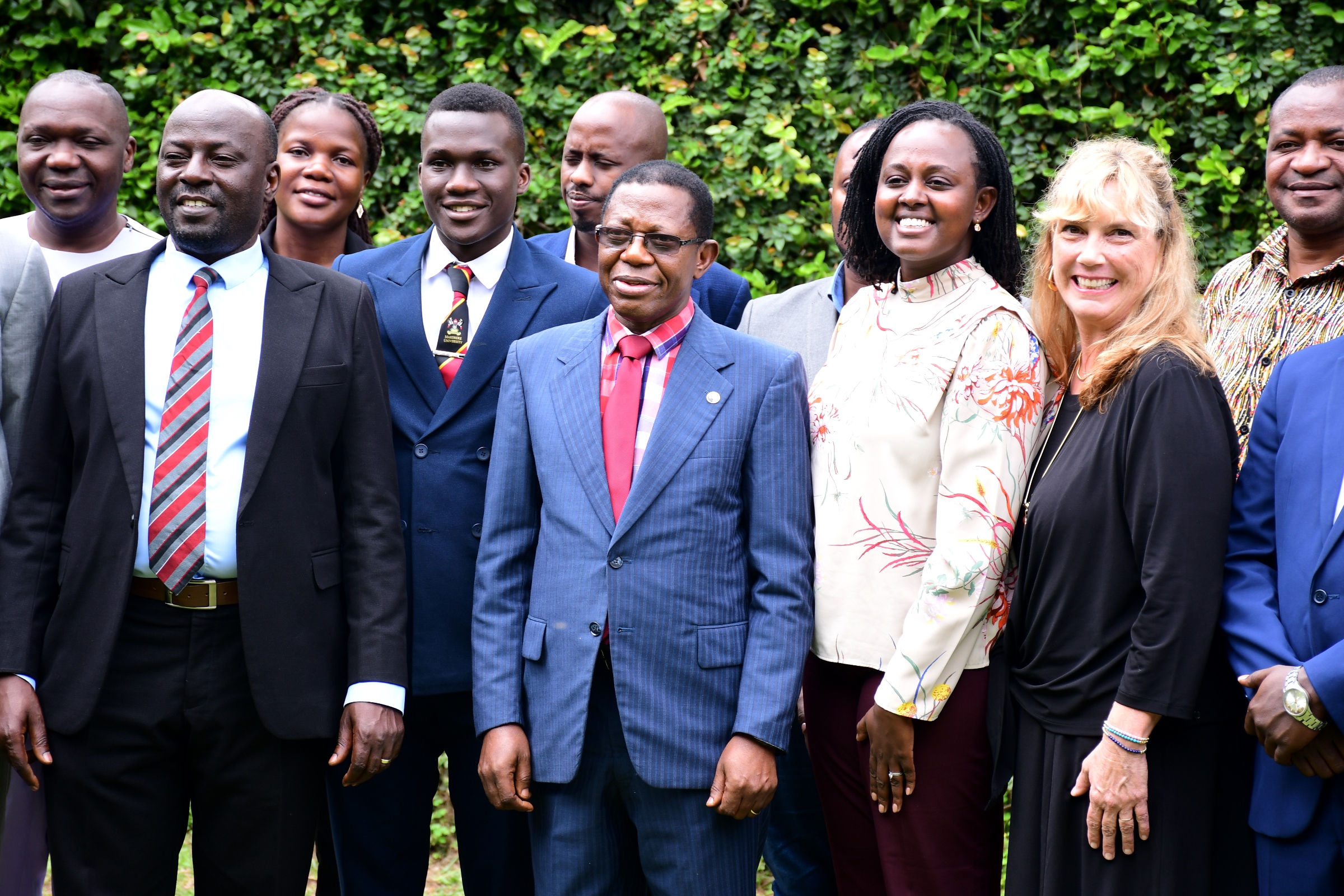
On Thursday 24th April 2025, the Director of the Institute of Open, Distance and E-learning under the College of Education and External Studies presented the dissemination results of phase 1 of the e-Learning initiative at Makerere University to over 75 participants and key stakeholders.
The dissemination brought on board Members of Makerere University Management, the Principal and staff from College of Education and External Studies (CEES), a representative from the Ministry of Education and Sports (MoES), student leaders, the Directorate for ICT Support (DICTS), Mastercard Foundation, Arizona State University (ASU)-USA and a representative sample of staff from academic and administrative units of Makerere University.
The dissemination of results of phase 1 of the e-Learning initiative follows the successful conclusion of the implementation process that kicked off in 2021 and ended in 2024. Phase 1 of the Mastercard Foundation Scholars Program e-Learning initiative has been implemented by the Institute of Open, Distance and E-learning (IODEL) in partnership with the Office of the Deputy Vice Chancellor (Academic Affairs).
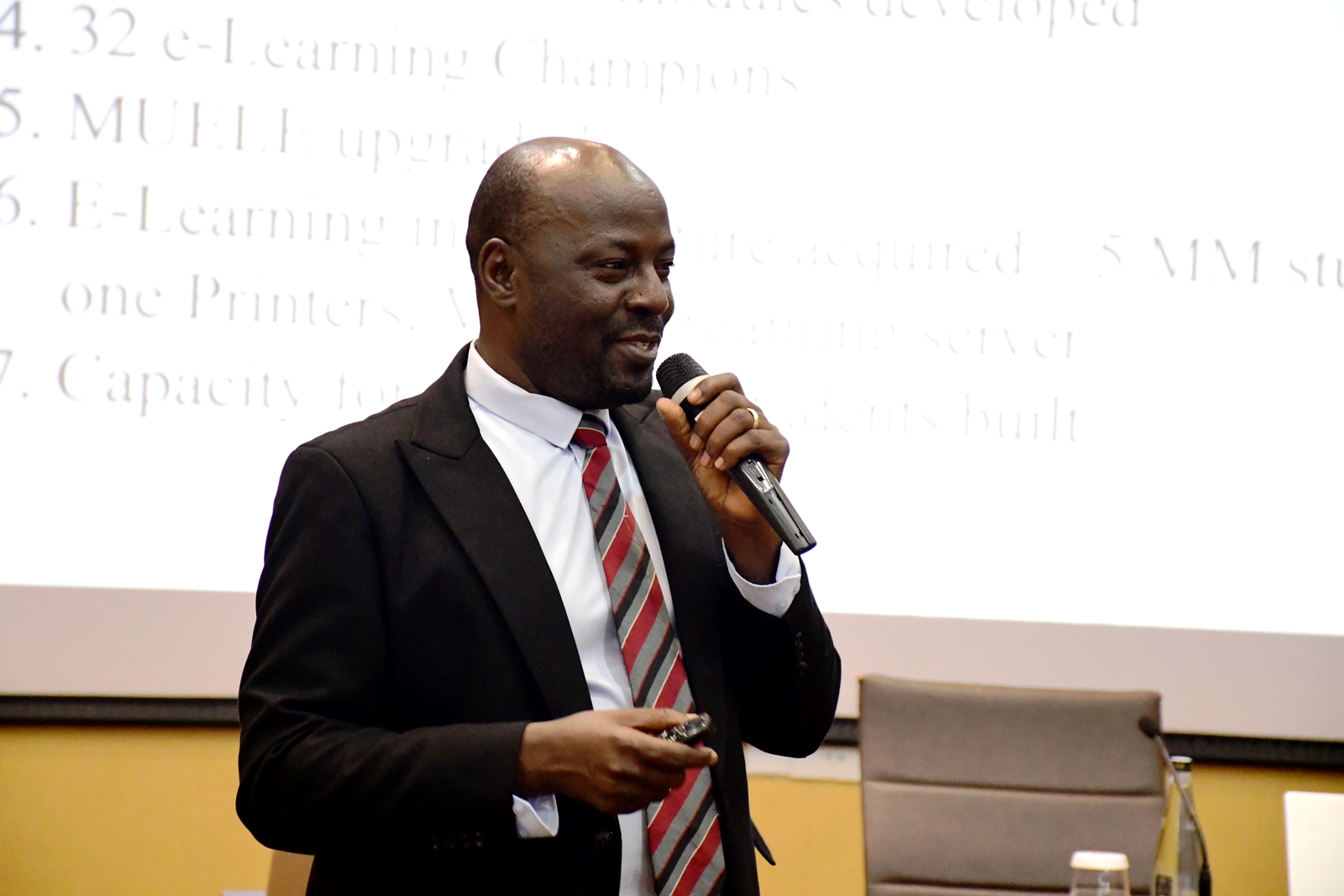
Addressing the participants, the Director of IODEL and the Principal Investigator, Prof. Paul Birevu Muyinda stated that the overarching goal of phase 1 was to enhance the e-learning capabilities with partner institutions. He elaborated that in phase 1, the Mastercard Foundation worked with 10 universities to digitally transform the teaching and learning processes.
“During the implementation of Phase 1, Makerere University has registered significant achievements in e-Learning. I am glad that you have convened here today during the e-Learning Digital Transformation workshop, to receive the dissemination results as we work together to prepare for Phase 2,” said Prof. Birevu Muyinda.
Phase 1 of the e-Learning initiative provided a platform to strengthen the existing Makerere University e-Learning Environment (MUELE), onboarding of the University leadership, staff and students for the successful implementation of e-Learning initiative, capacity building for staff and students, and involvement of the teaching staff to develop content for online courses.
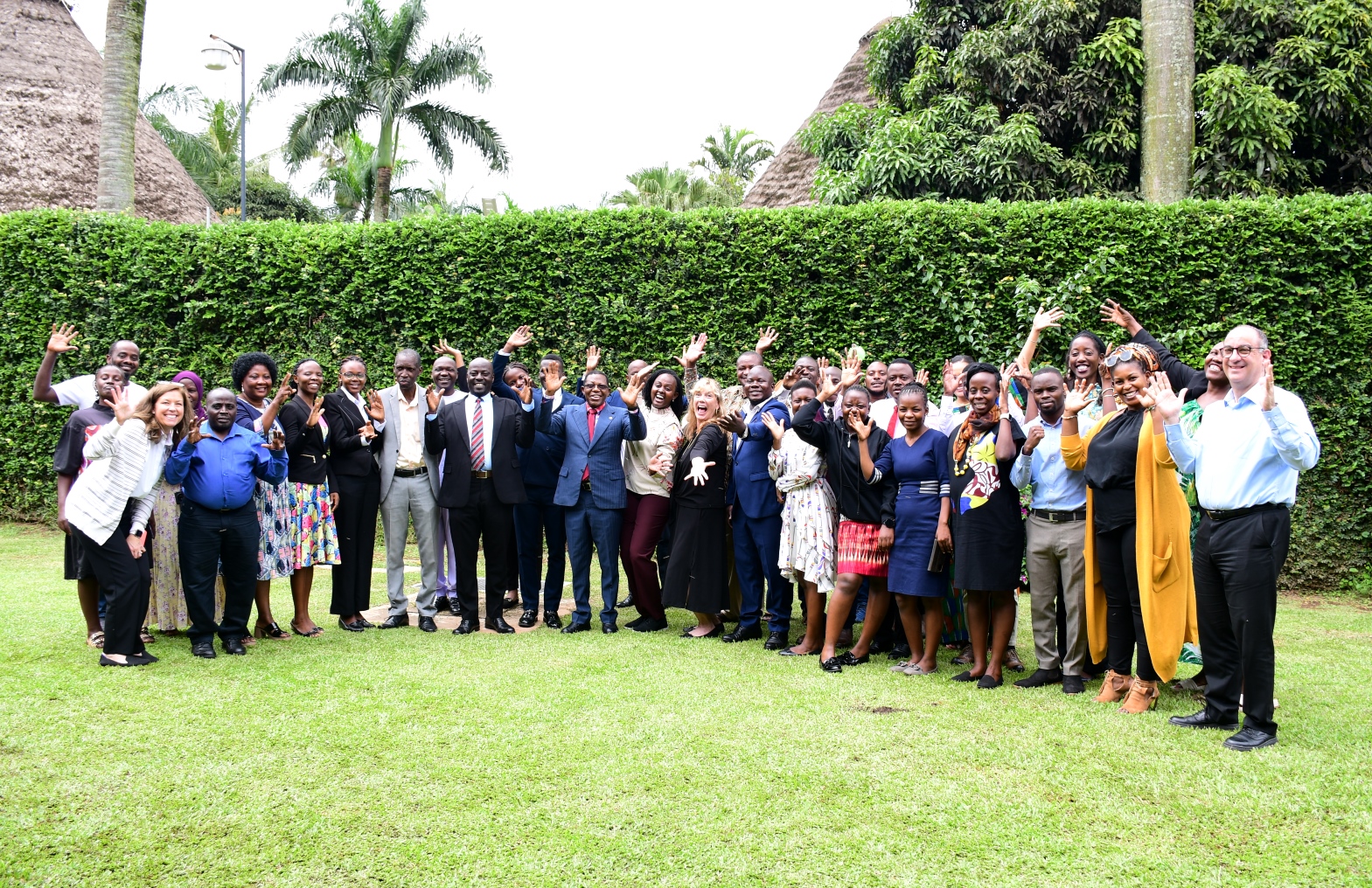
During the e-Learning Digital Transformation Workshop, Prof. Birevu Muyinda shared the dissemination results of phase 1 of the e-Learning initiative amidst applause from the participants, highlighting the following achievements:
- Training of 1,280 faculty members
- Development of 2,579 courses out of 2,560 representing 100.74%
- Development of four (4) support services modules
- Capacity building for over 7,000 students
- Training and recruitment of 32 e-Learning champions
- Upgrading of the Makerere University e-Learning Environment (MUELE)
- Acquisition of e-Learning infrastructure namely five (5) multi-media studios, a video streaming server and all in one printers.
Presenting the lessons learned, Prof. Birevu Muyinda informed the participants that top management support significantly contributed to the successful implementation of the program.
On this note, Prof. Birevu Muyinda acknowledged the University Council, the Vice Chancellor, Deputy Vice Chancellor (Academic Affairs), Deputy Vice Chancellor (Finance and Administration), the Academic Registrar, the University Secretary, DICTS and the entire leadership at the different levels for the support rendered in the execution of the different activities of phase 1.
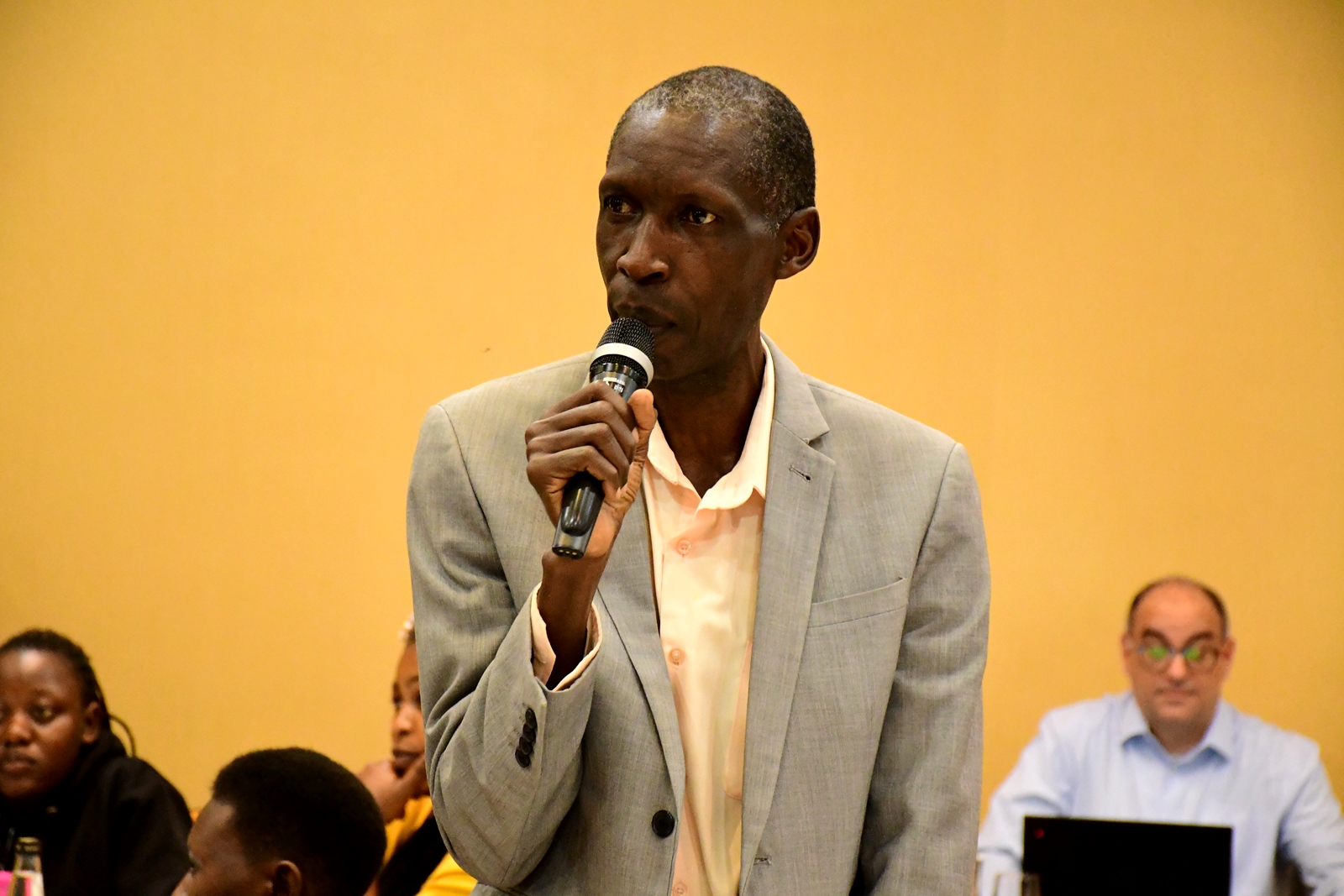
In appreciation, Prof. Birevu Muyinda requested the Principal of the College of Education and External Studies, Prof. Anthony Muwagga Mugagga, and the Ag. Deputy Vice Chancellor (Academic Affairs), Prof. Buyinza Mukadasi to convey the message of gratitude to the Top University Management and Central University Management respectively.
Underscoring top management support as a pre-condition for successful digital transformation, he provided a detailed account of the lessons learned in Phase 1. These include:
- Co-creation: Course co-creation breeds ownership and effective utilization
- Learning Designers: Learning designers are necessary for the pedagogical design of e-Courses
- Infrastructure: A robust integrated institutional, staff and students’ infrastructure is vital for successful e-Learning ecosystem
- Capacity building: Inclusive capacity building for staff and students is essential for successful digital transformation
- Multi-media Studios: Video content enhances flipped classroom pedagogy. This requires the setup of cost-effective multi-media studios operated by multi-media specialists who also provide ongoing technical support and capacity building
- Pedagogical Building Design: The design of new buildings in the University should take into consideration all pedagogical and inclusivity requirements
- Inclusivity: All courses should be designed following the universal design for learning principles
- Student Support: The success of online courses heavily relies on well structured student support offered by the University (coaches, mentors, facilitators, technicians, career guidance, counsellors) among others
- Central Unit: There should be a central unit (similar to Arizona State University-ASU’s EdPlus) to foresee the design, development and growth of digital and innovative pedagogy in the University
- Design thinking: There is need to use design thinking approaches in digital transformation processes in the University
- Partnerships: There is need to optimize collaborations for institutional growth
Background to Phase 1
The e-Learning Initiative is a program funded by Mastercard Foundation out of the need to address the negative effects of the COVID-19 pandemic that constrained access and continuity of teaching, learning and community engagement activities at Makerere University.
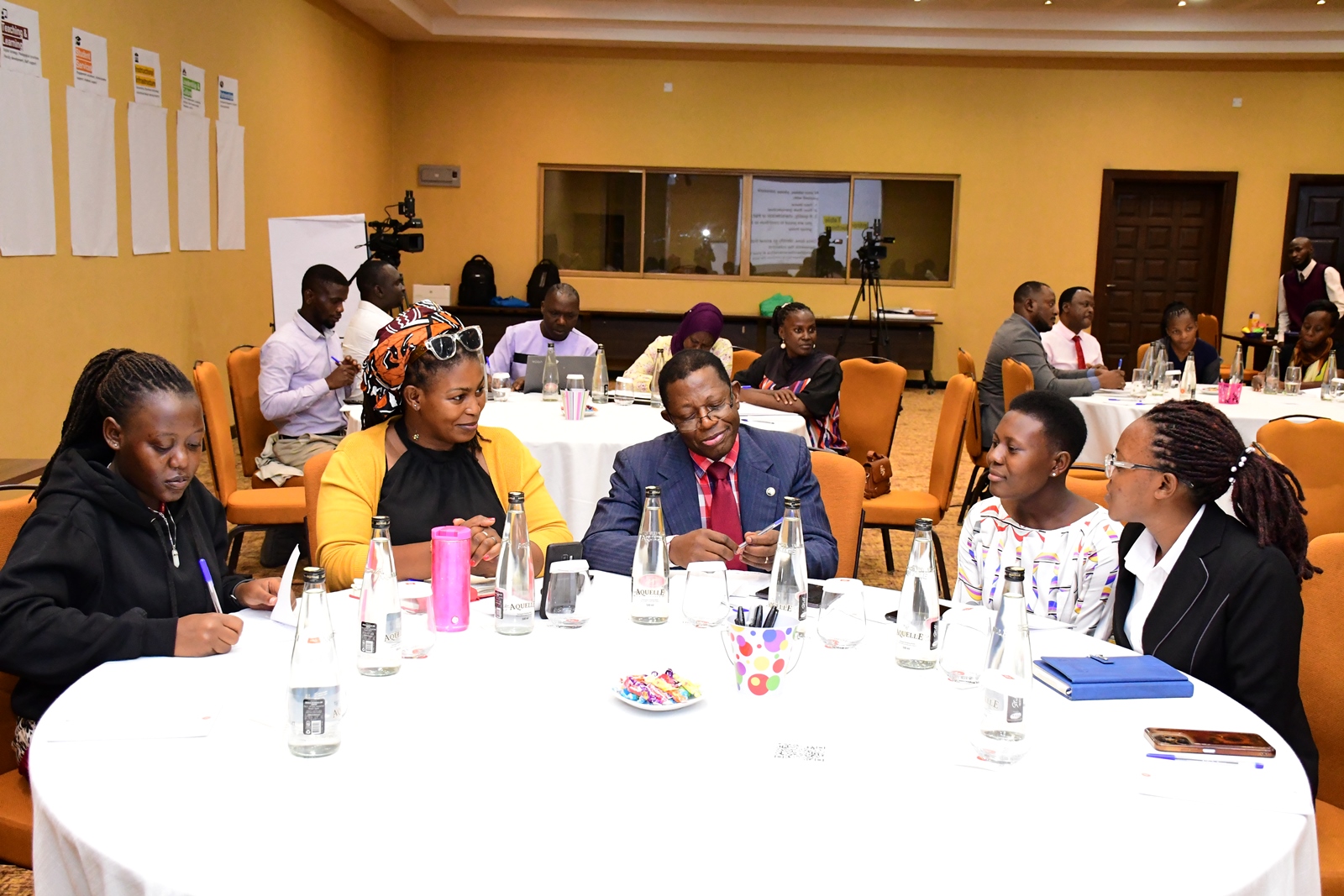
The COVID-19 pandemic disrupted the teaching and learning in a number of universities in Africa. As the pandemic intensified, the World Health Organisation and the respective countries issued Standing Operating Procedures (SOPs) which limited physical interactions, gatherings and restricted movements. In extreme cases, the respective governments declared a lockdown to reduce the spread of the deadly pandemic. The lockdowns affected a number of Universities, higher education institutions and schools that had to stop operations, close and send students home in order to save lives.
Makerere University continued to conduct online teaching and learning aided by its home grown, Makerere University e-Learning Environment (MUELE), managed by the Institute of Open, Distance and e-Learning under the College of Education and External Studies.
Although MUELE enabled Makerere University to conduct online teaching during the difficult time of the COVID-19 pandemic, the experience called for a robust approach to institutionalize MUELE and online teaching pedagogies.
In its strategic plan, Makerere University committed to providing innovative teaching and learning as well as adaptation to ICT trends. This strategic approach dictated the adoption of a blended approach towards teaching and learning. The COVID-19 period and post COVID-19 challenged Universities to come up with immediate, short-term and long-term measures to institutionalize e-Learning through onboarding of staff and students, creating content for online courses, and acquisition of the required infrastructure and equipment for e-learning.
Fortunately, the Mastercard Foundation issued a call for proposals for universities to compete for funding targeting quality delivery of and access to education during and post the COVID-19 era.
The IODEL team at Makerere University in partnership with the Deputy Vice Chancellor (Academic Affairs) seized this golden opportunity and submitted a proposal. Following the competitive processes and strict adherence to the required grant application procedures, Makerere University’s proposal was successful.
With the award of the USD 2million grant, Makerere University embarked on supporting colleges to develop high-quality content and revitalization of the Makerere University e-Learning Environment (MUELE). The Mastercard Foundation Scholars Program e-Learning Initiative was officially launched on Tuesday 20th September 2022 by Prof. Mary Okwakol, the Executive Director of the National Council for Higher Education (NCHE) at a colourful ceremony held at Makerere University Yusuf Lule Central Teaching Facility Auditorium.
You may like
-


Over 9,200 to graduate at Makerere University’s 76th Graduation
-


76th Graduation Highlights
-
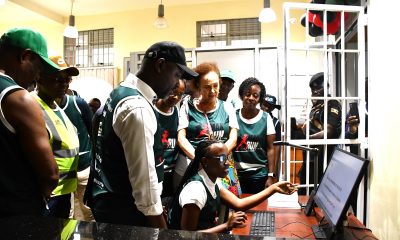

Students empowered to thrive through the Semester
-


Olivia Nakisita and the Quiet Urgency of Adolescent Refugee Health
-


Mastercard Foundation Scholars embrace and honour their rich cultural diversity
-
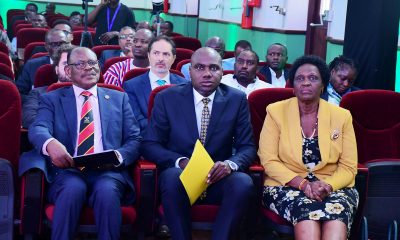

First African Symposium underscores the role of the Centre of Excellence for Africa Climate-Sensitive Macroeconomic Modelling
General
Over 9,200 to graduate at Makerere University’s 76th Graduation
Published
7 hours agoon
February 24, 2026
Pomp and colour defined the opening day of the Makerere University’s 76th Graduation Ceremony as thousands gathered to celebrate academic excellence and new beginnings.
The historic ceremony has brought together scholars, families, friends and industry partners in a vibrant celebration of achievement and possibility. Throughout the four-day event, the University will confer degrees and award diplomas to 9,295 graduands in recognition of their dedication and hard work.
Among the graduates, 213 will receive Doctor of Philosophy (PhD) degrees, 2,503 will graduate with Master’s degrees, and 6,343 will earn Bachelor’s degrees. In addition, 206 students will graduate with postgraduate diplomas, while 30 will be awarded undergraduate diplomas.
Of the total number of graduands, 4,262 are female and 5,033 are male. According to Vice Chancellor, this marks the first time in 15 years that male graduands have outnumbered their female counterparts.
The best overall graduand in the Sciences, Esther Ziribaggwa, graduated on the opening day with the Bachelor of Agricultural and Rural Innovation and an impressive Cumulative Grade Point Average (CGPA) of 4.77.

The ceremony marks a proud moment for Makerere University as it continues to nurture top-tier professionals across diverse fields.
While presiding over the graduation, the State Minister for Primary Education, Hon. Dr. Joyce Moriku Kaducu, on behalf of the First Lady and Minister of Education and Sports, Hon. Janet Kataaha Museveni, pointed out that Makerere University is a model institution, where leaders are nurtured, scholars are sharpened, and where dreams have been given direction.
In her address, Hon. Museveni, highlighted Government’s deliberate investment in research, innovation, and infrastructure to strengthen higher education in Uganda.
“The establishment of the Makerere University Research and Innovation Fund (RIF), supports high-impact research and innovation that directly contributes to national priorities and development. Through this initiative, thousands of researchers and innovators have pursued practical, scalable solutions that are transforming communities and key sectors across Uganda,” Mrs Museveni, said.
The Minister also noted that Parliament’s approved a USD 162 million concessional loan to upgrade science, technology, and innovation infrastructure at Makerere University. The funding will facilitate the construction of modern laboratories, smart classrooms, and state-of-the-art facilities for Engineering and Health Sciences, investments expected to position the University firmly within the Fourth Industrial Revolution.
“Government has embarked on the construction of a National Stadium at Makerere University and other institutions of higher learning across the country. This will promote physical education, strengthen talent identification, and boost investment in the sports sector,”

Turning to the graduands, the Minister encouraged them to see themselves not merely as job seekers, but as job creators and solution-makers.
Uganda and Africa need innovators who will modernize agriculture; engineers who will build quality infrastructure; healthcare professionals who will strengthen health systems; and educators who will inspire the next generation,” the Honourable Minister said.
She reminded graduates that they are entering a rapidly changing world shaped by Artificial Intelligence, climate change, and shifting global markets. To thrive, she advised them to remain adaptable, creative, and committed to lifelong learning.
She also encouraged graduates interested in entrepreneurship to tap into the Government’s Parish Development Model, which provides community-based financing and production support.
Quoting Proverbs 3:5–6, the Minister urged the graduates to trust in God as they embark on their next chapter.
She extended special appreciation to the Mastercard Foundation for its 13-year partnership with Makerere University in expanding access to education and empowering young people in Uganda and beyond.
In his speech, the Chancellor of Makerere University, Dr Crispus Kiyonga, urged graduands to harness research, innovation and technology to drive Uganda’s transformation.

“This is a milestone in your lives. You have invested time, discipline and hard work to attain these qualifications. It is important that you derive value from this achievement, not only for yourselves, but for your families and for society.” Dr Kiyonga, said.
Dr. Kiyonga expressed gratitude to the Government of Uganda for its continued financial support to the University, particularly the funding allocated under MakRIF, which he described as critical in strengthening the institution’s research capacity.
“Research plays a very vital role in the development of any community. Makerere as the oldest University in the country is doing a significant amount of research, However, more work is required to mobilize additional resources to further strengthen research at the University.” Dr Kiyonga, noted.
Acknowledging the challenges of a competitive job market, Dr. Kiyonga encouraged graduates to think beyond traditional employment pathways.
“It is true that the job market may not absorb all of you immediately. But the knowledge you have acquired is empowering. You can create work for yourselves, individually or in teams.” Dr Kiyonga, said.
He advised the graduands to embrace discipline, integrity and adaptability in the workplace, and to take advantage of technology and digital platforms to innovate and respond to societal challenges.
“Every development challenge presents an opportunity. Believe that you can apply your knowledge to create solutions with impact.” He said.
Addressing the congregation, the Vice Chancellor, Prof Barnabas Nawangwe, congratulated the graduands, particularly staff and societal leaders on their respective achievements.

“I congratulate all our graduands upon reaching this milestone. In a special way I congratulate the members of staff, Ministers, and Members of Parliament that are graduating today as well as children and spouses of members of staff,” Prof Nawangwe, said.
In his speech, Prof Nawangwe, recognized outstanding PhD students, particularly members of staff. who completed their PhDs in record time without even taking leave from their duties.
He called upon graduates not to despise humble beginnings but rather reflect on the immense opportunities around them and rise to the occasion as entrepreneurs.
“You are all graduating with disciplines that are needed by society. We have equipped you with the knowledge and skills that will make you employable or create your own businesses and employ others. Do not despair if you cannot find employment. Instead, reflect on the immense opportunities around you and rise to the occasion as an entrepreneur,” Prof Nawangwe, said.
Prof Nawangwe called upon the graduands of PhDs to use their degrees to transform the African continent.
“As you leave the gates of Makerere I urge you to put to good use the knowledge you have received from one of the best universities in the World to improve yourselves, your families, your communities, your Country and humanity. Let people see you and know that you are a Makerere alumnus because of the way you carry yourself in society with dignity and integrity. Put your trust in God and honour your parents and opportunities will be opened for you,” Prof Nawangwe, said.
Delivering a key note address, Prof. Nicholas Ozor, the Executive Director of the African Technology Policy Studies Network Nairobi, Kenya ((ATPS). Reminded the graduates that a degree is not a finish line but the beginning of accountability. “The world is a complex, fast changing and deeply unequal. Degrees make you responsible for others not better than them,” Prof Ozor, said.

The 76th Graduation Ceremony of Makerere University will be held from Tuesday 24th to Friday 27th February, 2026. A total of 213 PhDs (87 female, 126 male), 2,503 Masters (1,087 female, 1,416 male), 206 Postgraduate Diplomas (80 female, 126 male), 6,343 Undergraduate Degrees (2,999 female, 3,344 male), and 30 Undergraduate Diplomas (9 female, 21 male) will be graduating from all the Colleges.
Ms. Sarah Aloyo and Ms. Nakato Dorothy both students of the Bachelor of Procurement and Supply Chain Management emerged as the best in the Humanities and Best Overall students with a CGPA of 4.93. Mr. Ssewalu Abdul, a Bachelor of Leisure and Hospitality Management student emerged second best in the Humanities with a CGPA 4.90. Ms. Esther Ziribaggwa emerged as the best student in the Sciences with a CGPA of 4.77 in the Bachelor of Agricultural and Rural Innovation, while Mr. Simon Mungudit emerged second best in the Sciences with a CGPA of 4.76 in the Bachelor of Science in Petroleum Geoscience and Production.
Commencement Speakers
- Day 1 – Prof. Nicholas Ozor, the Executive Director of the African Technology Policy Studies Network, Nairobi, Kenya
- Day 2 – Prof. Dr. Maggie Kigozi, Chairperson Makerere University Endowment Fund Board
- Day 3 – Dr. Patricia Adongo Ojangole, Managing Director, Uganda Development Bank Limited
- Day 4 – Ms. Reeta Roy, Former President & Chief Executive Officer, Mastercard Foundation
The 76th Graduation Ceremony will be held at the Freedom Square following the schedule below:
Tuesday, 24th February, 2026
College of Agricultural and Environmental Sciences (CAES)
College of Computing and Information Sciences (CoCIS)
College of Education and External Studies (CEES)
School of Law (SoL)
Livestream Link for Day 1: https://youtube.com/live/wVGPA0FJ9pU
Wednesday, 25th February, 2026
College of Health Sciences (CHS)
College of Natural Sciences (CoNAS)
College of Veterinary Medicine, Animal Resources and Bio-security (CoVAB)
School of Public Health (SPH)
Thursday, 26th February, 2026
Makerere University Business School (MUBS)
College of Business and Management Sciences (CoBAMS)
Friday, 27th February, 2026
College of Engineering, Design, Art and Technology (CEDAT)
College of Humanities and Social Sciences (CHUSS)
Institute of Gender and Development Studies (IGDS)
Makerere Institute of Social Research (MISR)
General
Mak Selected to Host Alliance for African Partnership Africa Office
Published
1 day agoon
February 23, 2026
Makerere University has been selected to host the Africa Office of the Alliance for African Partnership (AAP). The significant milestone that underscores Makerere’s role in fostering research, innovation, and global collaborations across the continent was announced at a meeting of the University’s Central Management with an AAP delegation on 23rd February 2026.
Makerere’s selection was based on the University’s robust commitment, alignment with the AAP’s Strategic Plan, and proven ability to manage consortium activities. The AAP, which was initiated by Michigan State University (MSU) in collaboration with Ten African Universities and agricultural policy research networks in 2016, targets critical challenges in education, youth empowerment, health and nutrition, agri-food systems, science and technology, water, energy, environment, and culture and society.
Addressing the delegation consisting of AAP Co-Directors from MSU, Dr. Jose Jackson-Malete and Dr. Amy Jamison, accompanied by newly-appointed Director of the AAP Africa Office, Dr. Racheal Ddungu Mugabi and Ms. Clare Cheromoi, the Vice Chancellor, Prof. Barnabas Nawangwe who appreciated the choice of Makerere to host the Africa Office said:
“One of the greatest challenges facing African universities is PhD training, particularly supervisory capacity. Through partnerships such as the Alliance for African Partnership we can leverage international expertise to strengthen supervision—whether through training supervisors or through joint supervision arrangements.”
Prof. Nawangwe equally applauded joint initiatives such as the Grant Writing and Publication project, which gave rise to the establishment of a Writing Centre that he said can be used to build capacity in AAP member universities with Makerere as the hub. Officially launched on 21st March 2023, the project is living up to its expectation of becoming a springboard for strong postdoctoral collaborative research for both institutions and other US universities.
Dr. Titus Awokuse, Vice Provost and Dean for International Studies and Programs at Michigan State University (MSU) who attended virtually, reiterated that Makerere’s selection reflects its long-standing commitment to advancing African higher education, research excellence, and meaningful global collaboration.
Reflecting on the origins of the Alliance for African Partnerships (AAP), Dr. Awokuse explained that nearly a decade ago, MSU initiated a transformative conversation in Atlanta centered on the question: How should we partner differently? From this dialogue emerged AAP—an Africa-centered consortium that now brings together 12 institutions across Africa and the United States.

He emphasized that AAP is grounded in equity, mutual benefit, shared leadership, and deep respect for African priorities and expertise. Since its founding, MSU has served as convener and key supporter, working with member institutions to strengthen research collaboration, promote faculty and student engagement, and address shared development priorities.
Dr. Awokuse underscored that AAP’s success is the result of collective vision and commitment, not the efforts of a single institution. He paid tribute to Lilongwe University of Agriculture and Natural Resources for hosting the Africa Office in its early years and acknowledged the foundational leadership of the inaugural Africa Office Director.
He described the launch of the Africa Office at Makerere University as a significant milestone that reinforces Africa-led leadership, strengthens regional collaboration, and enhances responsiveness to emerging opportunities. MSU, he affirmed, remains fully committed to AAP and to working closely with Makerere and all consortium partners to expand collaborative research, nurture the next generation of scholars, and advance Africa-led solutions to global challenges.
The newly-appointed AAP Africa Office Director, Dr. Racheal Ddungu Mugabi is a member of faculty in the Department of Development Studies, Institute of Gender and Development Studies. Her work on intersectional inequalities in Uganda and other Global South regions uniquely positions her to drive collaborative research and partnerships at the Africa Office.
Initially founded by ten African Universities and MSU, AAP now comprises eleven African members including; the African Network of Agricultural Policy Institutes (ANAPRI)-Zambia, Egerton University-Kenya, Lilongwe University of Agriculture and Natural Resources (LUANAR)-Malawi, Makerere University-Uganda, United States International University-Africa-Kenya, Universite Cheikh Anta Diop-Senegal, Universite Yambo Ouologuem de Bamako-Mali, University of Botswana-Botswana, University of Dar es Salaam-Tanzania, University of Nigeria, Nsukka-Nigeria, and the latest, University of Pretoria-South Africa.
These Universites collaborate under Focal Points to advance policy-relevant research and sustainable development. Makerere University’s Focal Point is Prof. Robert Wamala, Director of Research, Innovations and Partnerships (DRIP).
Addressing the University Management, Dr. Jackson-Malete outlined the African Futures Research Leadership Program, which nurtures early career scholars through mentorship and skill-building as one of AAP’s flagship programs. She noted that the Program that prioritizes female participants or men committed to promoting women in higher education has for the first time during its fifth cohort admitted the first male, Dr. Alfadaniels Mabingo from the Department of Performing Arts and Film, Makerere University.
The AAP Africa Office at Makerere will coordinate activities, boost research collaboration, mobilize resources, and enhance global engagements for socio-economic transformation. This aligns with Makerere‘s broader goals of leveraging international expertise to build resilient institutions.
View more photos from the event: https://flic.kr/s/aHBqjCLjoA
Trending
-

 Humanities & Social Sciences2 days ago
Humanities & Social Sciences2 days agoMeet Najjuka Whitney, The Girl Who Missed Law and Found Her Voice
-

 Health6 days ago
Health6 days agoUganda has until 2030 to end Open Defecation as Ntaro’s PhD Examines Kabale’s Progress
-

 Agriculture & Environment5 days ago
Agriculture & Environment5 days agoUganda Martyrs Namugongo Students Turn Organic Waste into Soap in an Innovative School Project on Sustainable Waste Management
-

 General6 days ago
General6 days agoMastercard Foundation Scholars embrace and honour their rich cultural diversity
-

 Health2 weeks ago
Health2 weeks agoCall for Applications: Short Course in Molecular Diagnostics March 2026
